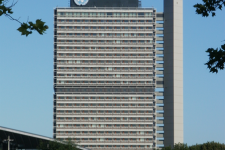As part of the SPEAR project, UN-SPIDER and ZFL organize and conduct events such as conferences, expert meetings, trainings or others, with a focus on supporting African countries in their efforts of using space-based technologies in the context of disaster management and emergency response. This page provides an overview of recent and upcoming events organized by UN-SPIDER and ZFL as part of the project.
Mapping for Disaster Risk Management: Using UN-SPIDER Recommended Practices and Digital Twin for Effective Flood Hazard Depiction
Effective flood mapping and modeling are crucial for disaster risk management, enabling authorities and communities to better prepare for and respond to extreme weather events. The SPEAR Project, by the Center for Remote Sensing of Land Surfaces (ZFL) at the University of Bonn and UN-SPIDER, works to support disaster risk management activities through innovative Earth Observation methods, with a regional focus on the African continent.
A key component of this initiative is the development of step-by-step mapping guides by UN-SPIDER, called “Recommended Practices” (RPs). These procedures, available through the UN-SPIDER knowledge portal, provide guidance on creating information products, such as flood maps. The RPs are continually refined through ongoing research and are designed to guide users—regardless of their experience with GIS and… Read more
Foreword
This Training Module Handbook is developed in the framework of the project “Copernicus User Uptake in Africa via technical support in the field of Disaster Management and Disaster Risk Reduction” (Short forms: Sentinels-4-African-DRR; S4ADRR). The project is funded through the Framework Partnership Agreement on Copernicus User Uptake (FPCUP Action 2019-2-48) and performed by the German Space Agency at DLR, with the support of the Center for Remote Sensing of Land Surfaces (ZFL) of the University of Bonn, Germany.
The project team collaborates closely with the United Nations Platform for Space-Based Information for Disaster Management and Emergency Response (UN-SPIDER), a program of the United Nations Office for Outer Space Affairs (UNOOSA). Further, there is close collaboration with the teams responsible for the Global Flood Awareness System (GloFAS) and the Global Drought Observatory (GDO) of the Copernicus Emergency Management Service (EMS).
… Read more
Introduction
In recent decades, communities in Africa have experienced disasters triggered by floods, droughts, landslides, forest fires, Ebola pandemics, and locust plagues that have eroded hard-won development gains. Taking note of advances in space technologies and other technological innovations, the African Union indicated in its 2017 African Space Policy that space represented a unique opportunity for cooperation in using and sharing enabling infrastructure and data towards the proactive management of, inter alia, responses to natural hazards and disasters. In that respect, the African Union aims to promote the use of space applications to improve weather forecasts and to develop a range of early warning systems, as Africa is subject to various extreme weather, climate, ecosystem, and geological events.
Convinced that space technologies can play a vital role in supporting disaster management, the United Nations General Assembly (UNGA) established the United… Read more
Link to registration: https://indico.un.org/event/1007916/
Agenda
To access the agenda (pdf), click the link here.
To access the report (pdf), click the link here.
Background
Natural and man-made disasters cause tremendous damage to societies around the world. They lead to loss of lives and property, displace people from their homes and destroy livelihoods, and disrupt sustainable development efforts worldwide. In recent years, climate change, extreme weather, population growth, and urbanization have led to an increasing number of people being threatened by natural disasters, and it has become a global challenge to mitigate disaster risks and… Read more
In November 2000, several space agencies joined forces to establish the International Charter "Space and Major Disasters". The International Charter has been set up as a worldwide collaboration through which products generated from satellite imagery are made available free of charge to those responding to disasters in any region of the world. By combining Earth observation assets from different space agencies, the Charter allows resources and expertise to be coordinated. Since it was launched, the Charter has been activated more than 800 times to contribute to disaster response efforts.
During activations, the members of the International Charter provide access to satellite imagery that is processed by Project Managers and Value-Added Providers (PMs & VAs) to generate useful and timely space-based information to be used in disaster response efforts. In the year 2022, the Charter introduced a new tool: the ESA Charter Mapper, to support PMs & VAs in the processing of… Read more

